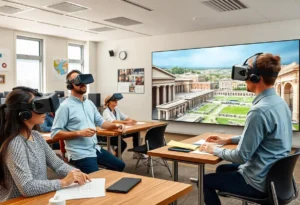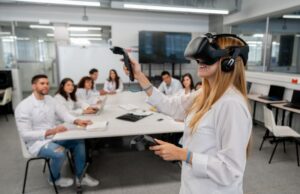Education is evolving rapidly, and one of the most striking changes is the rise of adaptive learning. Traditionally, teachers in traditional classrooms assumed that all children learned at the same pace and in the same way, so they used a single teaching method. Because this approach didn’t work for everyone, some students became bored because they understood too quickly, while others became frustrated because they couldn’t keep up. Adaptive learning addresses this problem by providing each student with a unique learning experience, allowing them to learn at their pace and based on their strengths and weaknesses.
The Concept Behind Adaptive Learning
Adaptive learning is a form of teaching that uses technology to change each student’s perspective on a subject. It works by gathering information about a student’s progress, analyzing it, and then adapting the content to their needs. This real-time adjustment creates a unique learning path for each student. Adaptive learning systems use algorithms and artificial intelligence to monitor student understanding and adjust instruction accordingly. This flexible approach ensures that students receive the right support and challenge at every learning stage.
Technology is the foundation of adaptability.
Adaptive learning would be impossible without technology. Advanced learning systems and software can collect extensive data on student performance while using digital content. These programs track how long students take on each question, how many correct answers they receive, and what types of errors they make. The system uses this information to determine what content to present next. For example, if a student is struggling to understand a math concept, the platform can offer more examples, make the explanations more comprehensible, or even adapt the learning format to videos or interactive exercises to deepen understanding.
A Unique Learning Path for Every Student
One of the most important ways adaptive learning will transform the future of education is by providing students with truly unique learning paths. No two students are the same, and adaptive systems understand this and design a different learning path for each student. The rest of the class does not hold back students who excel in certain subjects, allowing them to progress quickly. Conversely, students who require additional time can receive the necessary assistance without experiencing guilt or falling behind. This personalized learning helps students build confidence, learn independently, and achieve better overall academic performance.
Helpful Information for Teachers
Adaptive learning systems are not only beneficial for children but also offer significant advantages for teachers. These platforms provide teachers with a wealth of information about their students’ learning, allowing them to identify patterns, knowledge gaps, and specific needs. This information can help teachers decide how to adapt lessons, have students work in small groups, or provide individual tutoring. Adaptive learning technologies don’t replace teachers; they actually help them do their jobs better by giving them more time and information, allowing them to focus on the areas that need the most attention.
Boosting Engagement and Motivation
Students can lose interest when the material is too difficult or too easy. Adaptive learning maintains the right balance by adjusting the difficulty level in real time. Because the learning material remains relevant and challenging enough, students are more likely to stay engaged. When students feel the information is tailored to them, they stay motivated and take ownership of their learning. This sustained engagement not only helps students achieve better grades in school but also provides them a better feeling about school and learning in general.
Scalability Across Diverse Learning Environments
A major advantage of adaptive learning is its broad applicability. Adaptive systems can support multiple students simultaneously, whether they are in large classes, learning online, or studying at home. They also offer each student a unique learning experience. This makes adaptive learning particularly useful in schools with limited resources or time. Adaptive learning can help close the learning gap and ensure that everyone, regardless of location or background, has access to high-quality education and can learn at their pace. Adaptive learning is a crucial tool for transforming the global education landscape because it can be implemented at scale.
Preparing Students for the Future
In a world that values critical thinking, adaptability, and lifelong learning, students need more than just the ability to retain knowledge. Adaptive learning helps prepare them for the future by encouraging problem-solving, independent thinking, and continuous self-reflection. When students are given the tools to learn at their pace and receive feedback to support their learning, they learn the skills they need to succeed in this rapidly changing world. Adaptive learning teaches students how to learn, how to change, and how to grow—skills that are crucial for today’s job market and society.
Conclusion
Adaptive learning transforms the future of education, making it more personalized, data-driven, and responsive. It empowers students by understanding their individual needs and adapting their learning styles accordingly. It helps teachers by providing useful information and saving them time performing repetitive tasks. It maintains student interest by consistently presenting relevant content at the appropriate difficulty level. As technology advances, the effectiveness of adaptive learning will only increase. This new learning approach promises to create a better, more efficient, and more inclusive school system for all students, regardless of their starting point or how they learn.
FAQs
1. What does adaptive learning mean in schools?
Adaptive learning is a teaching method that uses technology to adapt lessons based on each student’s strengths, limitations, and learning progress.
2. How does adaptive learning differ from conventional teaching methods?
Adaptive learning adapts lessons in real time to the needs and abilities of each student, unlike traditional teaching methods that use the same pace and content for all students.
3. Is adaptive learning suitable for all ages?
Yes, adaptive learning can be used by people of all ages, from young children to adults, and is applicable to all types of schools, institutions, and businesses.
4. Will adaptive learning replace teachers?
No. Adaptive learning helps teachers by providing them with important information, allowing them to focus on delivering more personalized lessons. Adaptive learning works best when teachers provide real support.
5. Can adaptive learning be applied to all subjects?
Yes, it is suitable for many subjects, especially those that require gradual learning and regular practice, such as math, reading, science, and language arts.




